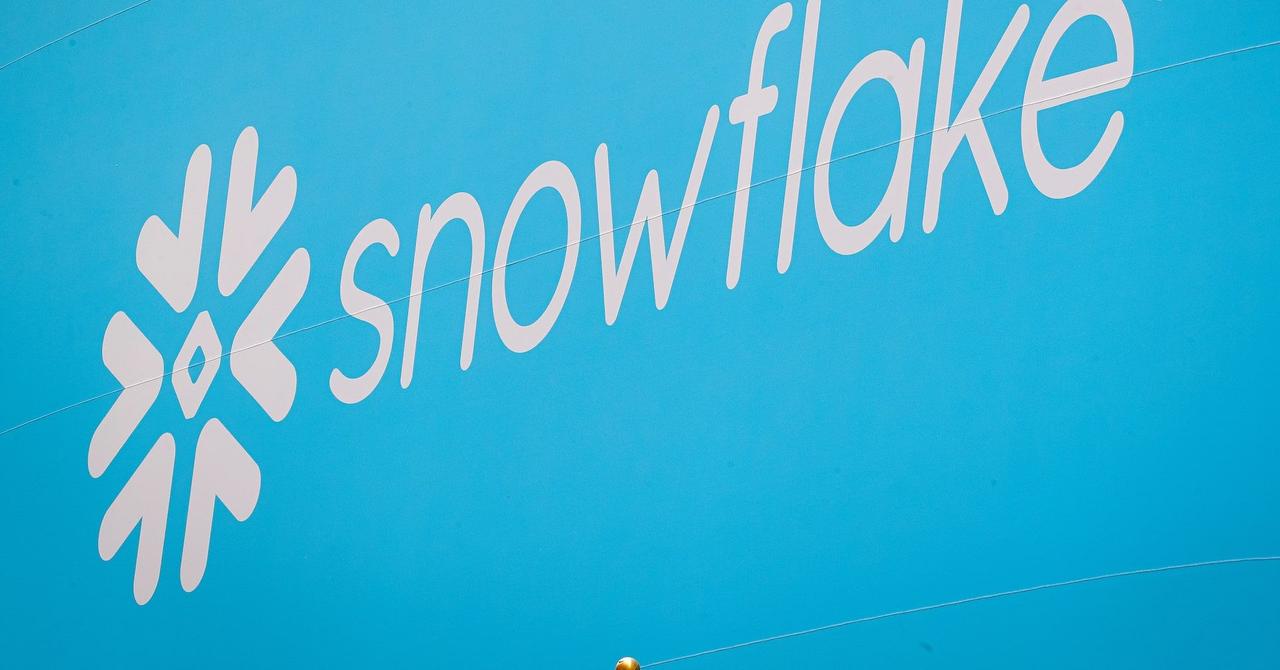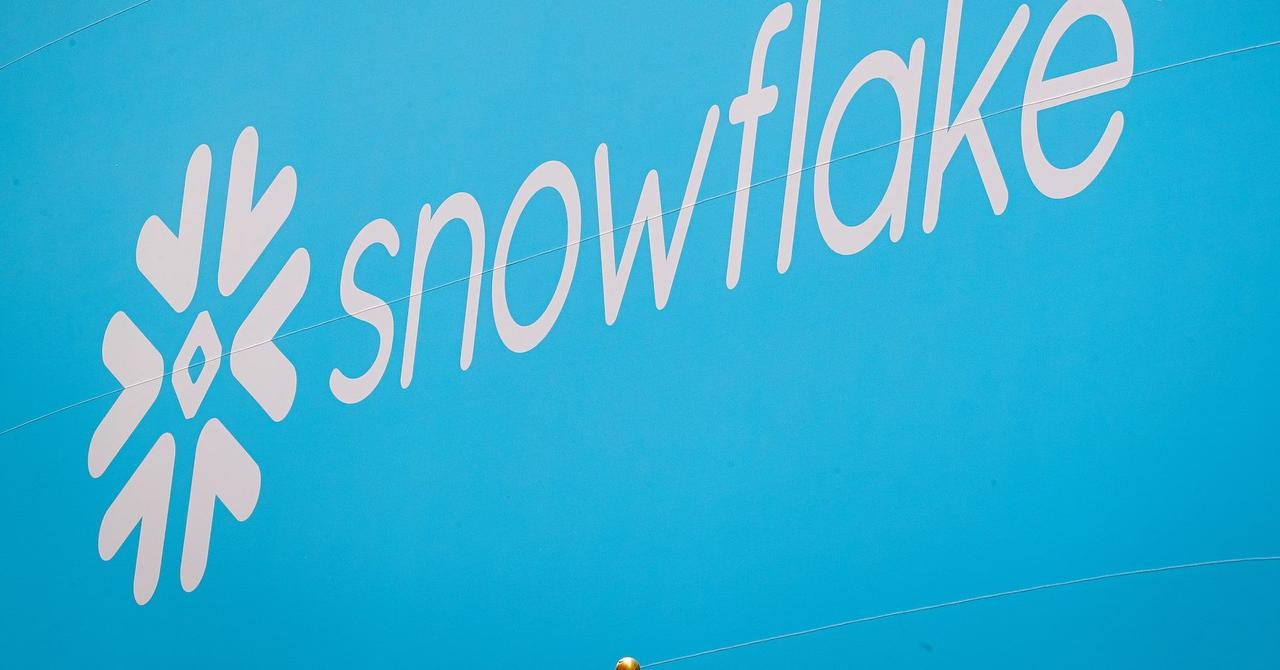Snowflake Stock: Analyzing Its Potential in the Next Year
2 Sources
2 Sources
[1]
Where Will Snowflake Stock Be in 1 Year? | The Motley Fool
It dropped from its 52-week high following the sudden resignation of CEO Frank Slootman, its longtime leader. He was replaced by Sridhar Ramaswamy, who came to Snowflake last year when it acquired internet search company Neeva, the enterprise he founded. Additionally, growth rates slowed, and the company suffered a security breach in April. Such challenges could lead to further declines for Snowflake stock over the next 12 months. However, it has recently bounced off its 52-week low, possibly leading investors to question whether it can recover over the next year. Snowflake is a data cloud company that competes with the top cloud companies. But its ability to operate in any cloud ecosystem gives it a competitive advantage. Moreover, customers pay Snowflake based on the amount of usage, a business model that's advantageous to investors. It reported net revenue retention in the first quarter of fiscal 2025 (ended April 30) of 128%. This means that the average customer spent 28% more on the platform than at the same time last year. The company also works with artificial intelligence (AI), helping to run AI and machine-learning workloads and incorporate generative AI in its processes. For all of the concerns about elevating Ramaswamy to the CEO position, his expertise will likely help add cutting-edge search capabilities to Snowflake's data cloud. However, Slootman's departure from Snowflake appeared to rattle investors. Furthermore, in April, the product suffered its aforementioned data breach, and some cybersecurity experts said that this may be the largest data breach in the industry's history. With privately held Databricks becoming an increasingly significant competitive threat, this could bring challenges for the data cloud company. The financials have also shown signs of these challenges. Revenue in fiscal Q1 was $829 million, 33% higher than year-ago levels. Still, revenue growth is in a downtrend as company projections estimate it will slow to 24% for the upcoming fiscal year, falling from its 36% increase in fiscal 2024. GAAP losses for fiscal Q1 were $317 million, up from $226 million in the year-ago quarter. Still, investors should note that Snowflake would have turned profitable if not for $332 million in stock-based compensation, a non-cash expense. Hence, its free cash flow, which also came in at $332 million in Q1, shows it's less dependent on outside funding than its losses might indicate. Snowflake's valuation has become more attractive in the last few months. Before recent issues came to light, its investors routinely saw price-to-sales (P/S) ratios above 20. Still, the lower stock price has taken this sales multiple down to 15, a record low for Snowflake and a level more comparable with other high-flying growth stocks. That comparative discount may put more investors at ease, considering that the company estimates the size of the addressable market will reach $342 billion by 2028. That factor alone could bode well for Snowflake, despite the added struggles. Given the business conditions, Snowflake could easily become a market-beating investment over the next year. Admittedly, the sudden CEO change and the data breach concern many of the company's shareholders. With revenue growth rates falling, investors may question the optimism surrounding Snowflake. Nonetheless, making Ramaswamy the CEO could pay off in the long term due to his experience with AI and search. The 15 P/S ratio could draw in some investors who previously thought Snowflake was too expensive. Considering the massive growth expected for the industry, it may be a good time for investors to start adding shares.
[2]
Where Will Snowflake Stock Be in 1 Year?
Investors can be forgiven for not knowing what to make of Snowflake (NYSE: SNOW). The stock fell over the last year as several issues came to light. It dropped from its 52-week high following the sudden resignation of CEO Frank Slootman, its longtime leader. He was replaced by Sridhar Ramaswamy, who came to Snowflake last year when it acquired internet search company Neeva, the enterprise he founded. Additionally, growth rates slowed, and the company suffered a security breach in April. Such challenges could lead to further declines for Snowflake stock over the next 12 months. However, it has recently bounced off its 52-week low, possibly leading investors to question whether it can recover over the next year. The state of Snowflake Snowflake is a data cloud company that competes with the top cloud companies. But its ability to operate in any cloud ecosystem gives it a competitive advantage. Moreover, customers pay Snowflake based on the amount of usage, a business model that's advantageous to investors. It reported net revenue retention in the first quarter of fiscal 2025 (ended April 30) of 128%. This means that the average customer spent 28% more on the platform than at the same time last year. The company also works with artificial intelligence (AI), helping to run AI and machine-learning workloads and incorporate generative AI in its processes. For all of the concerns about elevating Ramaswamy to the CEO position, his expertise will likely help add cutting-edge search capabilities to Snowflake's data cloud. However, Slootman's departure from Snowflake appeared to rattle investors. Furthermore, in April, the product suffered its aforementioned data breach, and some cybersecurity experts said that this may be the largest data breach in the industry's history. With privately held Databricks becoming an increasingly significant competitive threat, this could bring challenges for the data cloud company. Snowflake's financials The financials have also shown signs of these challenges. Revenue in fiscal Q1 was $829 million, 33% higher than year-ago levels. Still, revenue growth is in a downtrend as company projections estimate it will slow to 24% for the upcoming fiscal year, falling from its 36% increase in fiscal 2024. GAAP losses for fiscal Q1 were $317 million, up from $226 million in the year-ago quarter. Still, investors should note that Snowflake would have turned profitable if not for $332 million in stock-based compensation, a non-cash expense. Hence, its free cash flow, which also came in at $332 million in Q1, shows it's less dependent on outside funding than its losses might indicate. Snowflake's valuation has become more attractive in the last few months. Before recent issues came to light, its investors routinely saw price-to-sales (P/S) ratios above 20. Still, the lower stock price has taken this sales multiple down to 15, a record low for Snowflake and a level more comparable with other high-flying growth stocks. That comparative discount may put more investors at ease, considering that the company estimates the size of the addressable market will reach $342 billion by 2028. That factor alone could bode well for Snowflake, despite the added struggles. Snowflake in one year Given the business conditions, Snowflake could easily become a market-beating investment over the next year. Admittedly, the sudden CEO change and the data breach concern many of the company's shareholders. With revenue growth rates falling, investors may question the optimism surrounding Snowflake. Nonetheless, making Ramaswamy the CEO could pay off in the long term due to his experience with AI and search. The 15 P/S ratio could draw in some investors who previously thought Snowflake was too expensive. Considering the massive growth expected for the industry, it may be a good time for investors to start adding shares. The Motley Fool Stock Advisor analyst team just identified what they believe are the 10 best stocks for investors to buy now... and Snowflake wasn't one of them. The 10 stocks that made the cut could produce monster returns in the coming years. Consider when Nvidia made this list on April 15, 2005... if you invested $1,000 at the time of our recommendation, you'd have $791,929!* Stock Advisor provides investors with an easy-to-follow blueprint for success, including guidance on building a portfolio, regular updates from analysts, and two new stock picks each month. The Stock Advisor service has more than quadrupled the return of S&P 500 since 2002*. Will Healy has positions in Snowflake. The Motley Fool has positions in and recommends Snowflake. The Motley Fool has a disclosure policy. The views and opinions expressed herein are the views and opinions of the author and do not necessarily reflect those of Nasdaq, Inc.
Share
Share
Copy Link
An in-depth look at Snowflake's stock performance, growth prospects, and market position. This analysis explores the factors that could influence the company's stock price over the next year.

Snowflake's Current Market Position
Snowflake (NYSE: SNOW), a cloud-based data warehousing company, has been a subject of interest for investors since its high-profile IPO in 2020. The company's innovative approach to data storage and analytics has positioned it as a leader in the rapidly growing cloud computing sector
1
.Recent Stock Performance
As of July 2024, Snowflake's stock has experienced significant volatility. After reaching all-time highs in late 2023, the stock has seen a pullback, reflecting broader market trends and concerns about tech sector valuations. Despite this, many analysts remain optimistic about Snowflake's long-term potential
2
.Growth Drivers and Challenges
Snowflake's growth is primarily driven by the increasing demand for cloud-based data solutions. The company's unique architecture allows for seamless data sharing and analytics across multiple cloud platforms, giving it a competitive edge. However, Snowflake faces challenges, including intense competition from tech giants like Amazon, Microsoft, and Google, who offer their own cloud data warehousing solutions
1
.Financial Performance and Projections
In its most recent quarterly report, Snowflake demonstrated strong revenue growth, with a year-over-year increase of 48%. The company's net revenue retention rate, a key metric for SaaS companies, remained impressive at 158%, indicating strong customer loyalty and increased spending from existing clients
2
.Analyst Predictions
Wall Street analysts have mixed opinions on Snowflake's stock price trajectory for the next year. While some predict significant upside potential based on the company's market position and growth rates, others caution about the high valuation multiples and potential market saturation
1
.Related Stories
Factors Influencing Future Stock Performance
Several factors could impact Snowflake's stock price over the next year:
- Macroeconomic conditions, including interest rates and overall market sentiment
- Competitive landscape developments in the cloud computing sector
- Snowflake's ability to maintain its high growth rates and improve profitability
- Potential new product launches or strategic partnerships
- Regulatory changes affecting the tech industry
2
Investor Considerations
Investors considering Snowflake stock should weigh its strong growth potential against its current valuation. The company's innovative technology and strong market position make it an attractive long-term investment, but short-term volatility is likely to persist. As with any investment, diversification and thorough research are crucial before making investment decisions
1
.References
Summarized by
Navi
[1]
[2]
Related Stories
Recent Highlights
1
ByteDance's Seedance 2.0 AI video generator triggers copyright infringement battle with Hollywood
Policy and Regulation

2
Demis Hassabis predicts AGI in 5-8 years, sees new golden era transforming medicine and science
Technology

3
Nvidia and Meta forge massive chip deal as computing power demands reshape AI infrastructure
Technology








